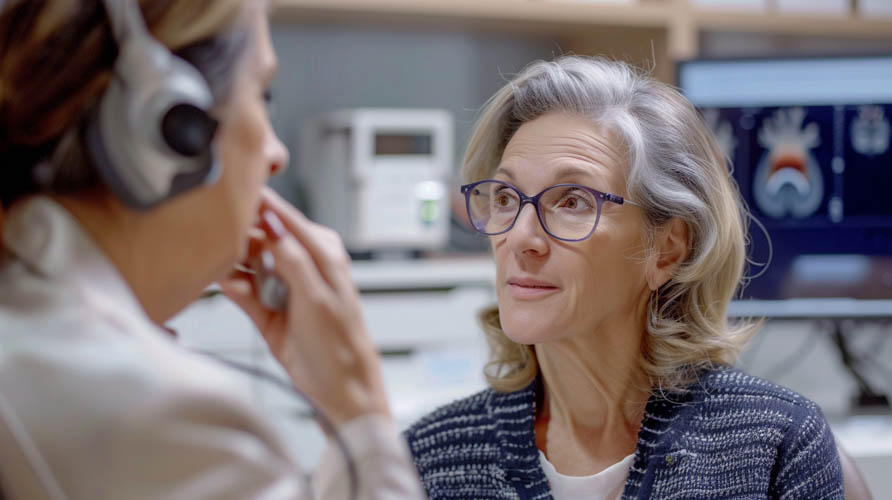Ignoring hearing loss in adults can lead to significant social, emotional, and cognitive consequences. You might find conversations challenging, causing social withdrawal and increasing feelings of loneliness. Hearing loss is often linked to cognitive decline and a higher risk of dementia. Common causes include ageing, exposure to loud noise, and certain health conditions. Barriers like stigma, high costs, and lack of awareness often prevent people from seeking help. Addressing hearing loss not only reconnects you socially but also protects your mental health. Stay tuned to discover how recognising early signs and overcoming barriers can make a big difference.
Prevalence and Impact
You might be surprised to learn just how common untreated hearing loss is among adults and the profound impact it can have on daily life. Millions of people experience hearing loss, but many don’t seek help, often due to stigma or simply not recognising the severity of their condition. This untreated hearing loss can significantly affect your social interactions, mental health, and even your physical well-being.
When you can’t hear clearly, conversations become challenging, leading to social withdrawal and isolation. You might find yourself avoiding gatherings or struggling to follow along, which can lead to feelings of loneliness and depression. It doesn’t stop there; untreated hearing loss is also linked to cognitive decline and an increased risk of dementia. Your brain has to work harder to process sounds, which can exhaust your cognitive resources over time.
Moreover, there are safety concerns. If you can’t hear alarms, sirens, or approaching vehicles, your risk of accidents increases. Even simple tasks like crossing the street or driving can become hazardous. So, understanding the prevalence and impact of hearing loss underscores the importance of seeking timely treatment to improve your quality of life.
Common Causes
Among the common causes of hearing loss in adults, exposure to loud noise and ageing are the most prevalent factors. If you’ve spent years in noisy environments, like construction sites or concerts, your hearing might suffer as a result. Prolonged exposure to sounds above 85 decibels can damage the sensitive hair cells in your inner ear, leading to permanent hearing loss. Even everyday activities, like using headphones at high volumes, can contribute to this issue over time.
Ageing is another significant cause. As you get older, the structures in your ear naturally deteriorate. This age-related hearing loss, known as presbycusis, affects both ears and progresses gradually. You might notice it becoming harder to hear high-pitched sounds or follow conversations in noisy places.
Other causes include ear infections, which can lead to temporary or permanent hearing loss if untreated, and certain medications that have ototoxic side effects. Diseases like diabetes and hypertension can also impair your hearing by affecting blood flow to the auditory system. Understanding these common causes can help you identify early signs of hearing loss and take preventive measures to protect your hearing health.
Barriers to Treatment
Many adults with hearing loss don’t seek treatment due to a combination of stigma, cost, and lack of awareness. You might feel embarrassed or worried about how others will perceive you if you wear a hearing aid. This stigma can make you hesitant to acknowledge the problem, let alone take steps to address it.
Cost is another significant barrier. Hearing aids and other assistive devices can be expensive, and insurance coverage isn’t always comprehensive. You might find it difficult to justify spending a large amount on a device, especially if you’re already managing other expenses. The high cost can deter you from even considering a hearing evaluation.
Lack of awareness also plays a crucial role. You might not realise how much you’re missing out on in conversations or social interactions. Sometimes, hearing loss can progress gradually, and you may not notice the extent of the problem until it significantly impacts your daily life. Additionally, you might not be aware of the available treatment options or where to seek help.
Addressing these barriers involves increasing awareness, reducing stigma, and improving access to affordable care. Changing perceptions and providing more information can help you take that crucial first step towards better hearing health.
Social and Emotional Effects
Living with untreated hearing loss can significantly affect one’s social interactions and emotional well-being. You might find yourself withdrawing from conversations because it’s too difficult to follow along. This can lead to feelings of isolation, as you miss out on the nuances and joy of social exchanges. Over time, this withdrawal can cause you to feel disconnected from friends and family, who may not fully understand your struggles.
Emotionally, untreated hearing loss can take a toll. You might experience frustration and embarrassment when you can’t hear properly. These feelings can erode your confidence, making you less likely to engage in social activities or seek help. The constant effort to hear and understand can also lead to mental fatigue, increasing your stress levels.
Furthermore, the lack of engagement in social activities can contribute to feelings of loneliness and even depression. It’s not uncommon to feel a sense of loss as you miss out on important conversations and events. Addressing hearing loss can significantly improve your quality of life, helping you to reconnect with loved ones and regain your confidence. Ignoring it, however, exacerbates these social and emotional challenges, making it crucial to seek timely intervention.
Cognitive Health Risks
Beyond social and emotional challenges, untreated hearing loss can also pose significant risks to your cognitive health. Studies have shown a strong link between hearing loss and cognitive decline, including conditions like dementia and Alzheimer’s disease. When you struggle to hear, your brain has to work harder to process sounds. This extra effort can take its toll, potentially leading to faster cognitive deterioration.
Moreover, untreated hearing loss often results in reduced social interaction. When you avoid conversations because you can’t hear well, you’re less likely to engage in stimulating activities that keep your brain sharp. Over time, this isolation can contribute to cognitive decline.
Additionally, the brain regions responsible for hearing can shrink due to lack of stimulation. This atrophy can further impair your cognitive functions. Even simple tasks that require auditory input can become more challenging, affecting your overall mental agility.
It’s essential to address hearing loss promptly to mitigate these risks. Regular hearing check-ups and early intervention can make a significant difference in maintaining your cognitive health. Don’t ignore the signs; taking action now can help protect your brain and improve your quality of life.
Advances in Hearing Technology
Recent advancements in hearing technology are revolutionising the way we manage hearing loss. If you’re experiencing hearing difficulties, you’ll be amazed at how far hearing aids have come. Modern devices are no longer bulky or obtrusive; many are nearly invisible and can be customised to fit your lifestyle.
Current hearing aids come equipped with features like Bluetooth connectivity, allowing you to stream audio directly from your phone or TV. Imagine watching your favourite show or taking a call, all with crystal-clear sound. Additionally, many devices now have rechargeable batteries, eliminating the hassle of constantly replacing them.
One of the most impressive advancements is the integration of artificial intelligence. These smart hearing aids can adapt to your environment, automatically adjusting settings to optimise sound quality. They can even learn your preferences over time, providing a tailored listening experience.
Moreover, telehealth options allow you to receive remote adjustments and consultations from your audiologist without leaving home. This means you get the support you need when you need it.
If you haven’t explored the latest in hearing technology, now’s the time. These innovations can significantly improve your quality of life.



